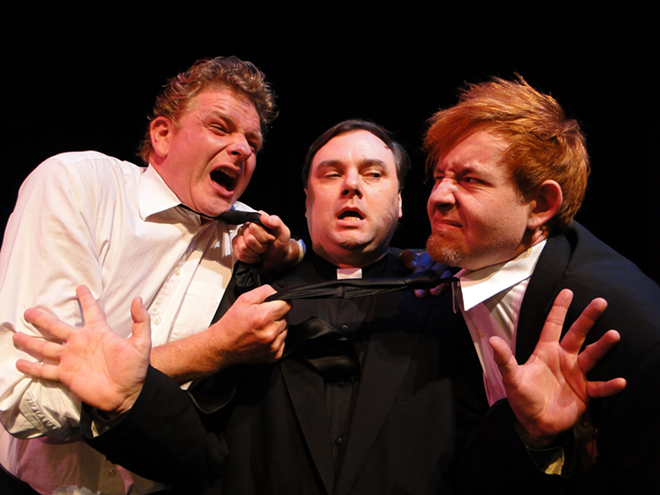
WHEN BROTHERS ATTACK: The Lonesome West stars, from left, Matt Lunsford, Brian Shea and David M. Jenkins.
What do you call it when you when you have no faith in God, when your local priest is a drunk, depressed incompetent, when brotherly love has become a competition between mortal enemies, when the fate of holy figurines is to be smashed or melted in an oven, when honoring your father means shooting him in the head, and when someone cruelly butchers your beloved dog and leaves him to die?
If you’re Martin McDonagh, you call it a comedy.
The Lonesome West, currently appearing in a superb production by Jobsite Theater, is that most surprising of things, an exercise in nihilism that also happens to be exceedingly funny. The key characters in the Irish village of Leenane (also the venue of The Beauty Queen of Leenane and A Skull in Connemara) are what’s left of humanity after Nietzsche pays a visit: valueless, heartless, murderous (or suicidal) ciphers. There are the brothers, Coleman and Valene, whose petty hatred of each other is always just moments from violence; their young friend Girleen, who loves to mock the self-doubting Father Welsh; and Father Welsh himself, who’s painfully aware of his own irrelevance and tries, for lack of a better expedient, to drown his woes in alcohol.
In two often hilarious acts, the brothers rant and roughhouse while the priest fruitlessly tries to remind them of their bond, and the girl pretends, just for fun, to be pregnant. This is life without purpose (beyond immediate needs), and if it doesn’t have a plot, well, what else would you expect from dumb animals? Still, McDonagh’s dialogue is brilliant, and eventually someone does make an effort to shock the battling Coleman and Valene into forgetting their differences and loving each other. The ultimate fate of that effort — desperate and generous as it is — is McDonagh’s last word on the world as he sees it: void and without transcendence. One hint: Lonesome West makes Waiting for Godot look wildly hopeful.
The Jobsite cast couldn’t be better. David M. Jenkins, the company’s artistic director, gives one of his best performances ever as thin-skinned, feral Coleman. When the play begins, Coleman and Valene are just returning from the funeral of their father, shot by Coleman either in error or in cold blood. As the play proceeds, Jenkins shows us that Coleman is capable of far worse than parricide: he’s mean-spirited and duplicitous and full of ill-will toward anyone his attention happens to light upon. This is a leaner, more angular Jenkins than we’ve known in past years, and the change works wonderfully for Coleman, who has the shiftiness of a hyena and the quickness of a rattlesnake. As his brother Valene, Matt Lunsford is also splendid, suggesting with minimal effort a lummox dominated by greed, superstitious rather than religious, naïve to the point of peril.
The look on Lumsford’s face as he caresses yet another of his prize figurines — saints and Virgin Marys — might just as well be a Neanderthal’s as he fingers some unlucky prey’s pelt. And the pride Lunsford’s Valene shows after he purchases a new stove is so total and childlike, you’d think he was 6 years old and just praised for eating all his vegetables. This is a very fine performance.
And then there’s Brian Shea as the hapless Father Welsh. There was a time, not so many years ago, when every producer in the Bay area seemed to want Shea on stage, and this performance reminds us why. Shea’s Welsh looks with haunted eyes on a landscape of nonbelievers (“It seems like God has no jurisdiction in this town,” he says at one point). He hasn’t forgotten his vocation; it’s just that no-one else in Leenane shares his faith, hope, or charity, and the lack of validation leaves him feeling isolated in the wilderness. So he drinks — everyone knows it — and when Girleen tries to tell him that she, at least, cares about him, he’s too far gone to really hear her. Which is a pity: as played by Caitlin McDonald Eason, Girleen is the only person in town who may still have much of a soul. (She also has comparatively little stage time, which is the audience’s misfortune.) The play is beautifully directed by the vastly talented Paul Potenza, who directed The Beauty Queen of Leenane a decade ago, with a co-directing credit to Ned Averill-Snell.
Brian Smallheer’s impeccable set represents a dowdy living room and kitchen in one. As always, Katrina Stevenson’s costumes are first-rate.
There’s one small flaw in The Lonesome West: the last scene is too long. Aside from that, this, like every other play McDonagh has written, is something to know and savor. Kudos to Jobsite for bringing it to Tampa — and for presenting it with the sort of love that Father Welsh, at least, would understand.

